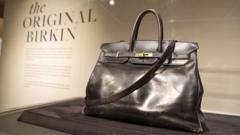In the latest development surrounding Nicolas Puech, an heir to the Hermès luxury empire, a court case has emerged after he allegedly failed to honor a deal to sell a significant stake in the family business to the Qatari royal family. This saga highlights the ongoing uncertainty and complexity surrounding Puech's wealth and ambitions.
The Complicated Legacy of Hermès Heir Nicolas Puech: A Deal in Turmoil

The Complicated Legacy of Hermès Heir Nicolas Puech: A Deal in Turmoil
Nicolas Puech, a prominent figure in the luxury goods industry, faces litigation over a contentious share deal with Qatar's royal family and grapples with the intricacies of his inherited wealth.
Article Text:
Nicolas Puech, an heir to the Hermès luxury brand, finds himself at the center of a legal dispute that raises questions about his wealth and the intricacies of a recent share transaction. The controversy began when Puech agreed to sell over six million shares of Hermès—approximately 5 percent of the company—to the royal family of Qatar, a deal valued at $15 billion. However, in a surprising twist, Puech claims he cannot access these shares, indicating they may be unaccounted for after a mismanagement incident involving a wealth advisor.
A federal lawsuit filed in Washington, D.C., has brought this matter to court, accusing Puech of violating the contractual agreement he made with the Qatari monarchs. While the case remains sealed, it highlights the enigmatic nature of Puech's fortune, where the line between billionaire and mere claimant seems increasingly blurred. Interestingly, this is not the first time Puech's dealings have drawn public scrutiny; he previously garnered attention when he attempted to adopt his longtime gardener with an eye toward inheritance, a move met with pushback from his philanthropic foundations.
Puech, now 82, represents the legacy of Thierry Hermès, whose name has become synonymous with luxury and exclusivity in fashion. The brand itself was recently evaluated at an astounding $300 billion, which only adds to the stakes of the current legal wrangling. The outcome of this case could not only redefine Puech's status within the Hermès empire but also expose deeper layers of the luxury market's ongoing relationship with wealth and power, particularly as it relates to the aspirations of the Gulf region's monarchies. The tale of Nicolas Puech continues to unfold with each new chapter, a compelling narrative interwoven with ambition, legacy, and uncertainty.
Nicolas Puech, an heir to the Hermès luxury brand, finds himself at the center of a legal dispute that raises questions about his wealth and the intricacies of a recent share transaction. The controversy began when Puech agreed to sell over six million shares of Hermès—approximately 5 percent of the company—to the royal family of Qatar, a deal valued at $15 billion. However, in a surprising twist, Puech claims he cannot access these shares, indicating they may be unaccounted for after a mismanagement incident involving a wealth advisor.
A federal lawsuit filed in Washington, D.C., has brought this matter to court, accusing Puech of violating the contractual agreement he made with the Qatari monarchs. While the case remains sealed, it highlights the enigmatic nature of Puech's fortune, where the line between billionaire and mere claimant seems increasingly blurred. Interestingly, this is not the first time Puech's dealings have drawn public scrutiny; he previously garnered attention when he attempted to adopt his longtime gardener with an eye toward inheritance, a move met with pushback from his philanthropic foundations.
Puech, now 82, represents the legacy of Thierry Hermès, whose name has become synonymous with luxury and exclusivity in fashion. The brand itself was recently evaluated at an astounding $300 billion, which only adds to the stakes of the current legal wrangling. The outcome of this case could not only redefine Puech's status within the Hermès empire but also expose deeper layers of the luxury market's ongoing relationship with wealth and power, particularly as it relates to the aspirations of the Gulf region's monarchies. The tale of Nicolas Puech continues to unfold with each new chapter, a compelling narrative interwoven with ambition, legacy, and uncertainty.





















